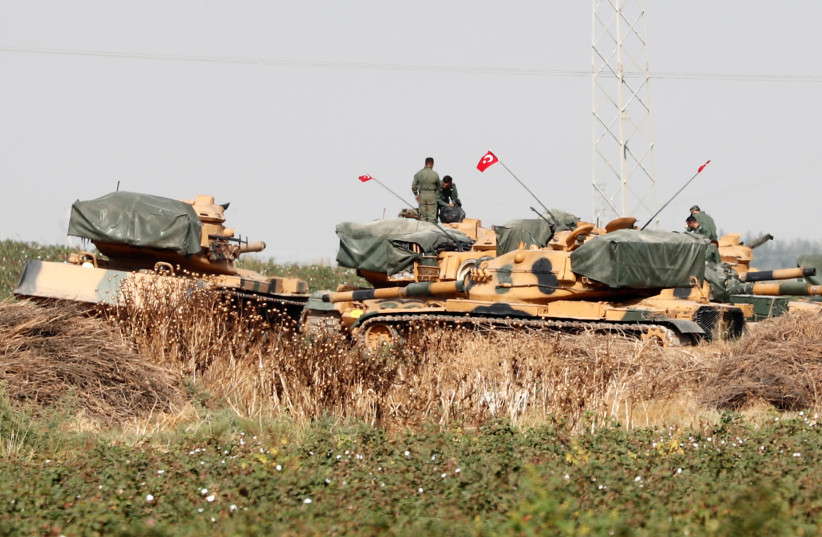Turkey’s Defense Minister Hulusi Akar and Hakan Fidan, head of Turkey’s National Intelligence Organization (MIT) are in the midst of talks in Moscow, Turkish media has reported. Anadolu reported on Wednesday that the two “will hold multiple meetings in the capital Moscow, according to diplomatic sources.”
According to Russian state media RIA, the defense ministers of Russia, Turkey and Syria held talks in Moscow on Wednesday. Russia’s defense ministry confirmed the talks as well. The reports said "that these talks relate to resolving the Syrian crisis and the problem of refugees." Reading between the lines of the statements though, it is clear that the story is much larger – they want to talk about “combating extremist groups.”
While not enough is known about the substance of the talks, Turkey in recent months, has hinted at high-level meetings that it is conducting with Syria, perhaps to patch up relations.
Ankara has, for the last decade, backed rebel and extremist groups in Syria. It has also sought to use former Syrian rebels to fight the US-backed Syrian Democratic Forces (SDF) and Kurdish groups in places like Afrin, Tel Rifat and Serekaniya.

In December, Turkey said after similar meetings that normalization with Syria would be possible. An Axios report from December 21 reads: “Hakan Fidan, the head of Turkey’s National Intelligence Organization, has met with his Syrian counterpart, Ali Mamlouk, in Damascus several times this year to try to arrange a meeting between the foreign ministers. The new Turkish position was welcomed by Russia, which has already been preparing the path for a possible meeting between the two leaders.”
Turkey, Russia and Iran have all sent forces into Syria, worked with local groups and met in Astana to discuss reducing the conflict in the country.
Ankara and Moscow both oppose America’s role in Syria. The US initially got involved in Syria to back the rebels but then shifted to fighting ISIS. After 2015, its role with the rebels was reduced. Turkey then stepped in and began to view the rebels as an ideal proxy group to fight the Kurds, going as far as accusing the Kurdish YPG – and the SDF – of being “terrorists.”
Rumors increased in recent weeks about Turkey launching a new invasion of Syria. London-based website Middle East Eye ran an article suggesting that both Turkey and the SDF are pitching themselves as partners against ISIS.
But Turkey has shown that it doesn’t prioritize the fight against ISIS. In fact, Washington found many ISIS leaders sheltering near the Turkish border in Idlib and Afrin. The rumors of Turkey-Syria reconciliation are clear – and hints by Ankara that this normalization will come after high-level meetings of officials now appear to be in the works in Moscow.
What is Moscow’s goal here?
WHAT IS Russia’s goal here? It has been selling Turkey S-400s and is interested in closer ties. Russia has also been intensifying its rhetoric against the West and Ukraine over the past few days. It wants Turkey on its side for a variety of purposes.
It also might prefer a deal with Turkey where Russia gives Ankara something in exchange for a deal with Damascus and green-lighting a Turkish operation in Syria. This is high stakes for Russia because it is at war with Ukraine and wants countries to hedge their bets with the West. Turkey is a NATO member but has worked to block Sweden and Finland from joining the alliance, a move that aids Moscow.
In addition, Russia is in the midst of talks with Azerbaijan and Armenia about Nagorna-Karabakh in the Caucasus, a place where Russia could use Turkey’s help as well, since they have common interests. They both want to weaken the American role in Syria, they both want to challenge NATO and they both want trade deals. They don’t always agree on issues in Syria, but their common enemies might be bigger than each other.
Russian Foreign Minister Sergey Lavrov has been routinely slamming the West in interviews: This is a clear message from Moscow. And he is not the only key figure doing so while welcoming Turkey, which is supposed to be an ally of the West but has also continually hedged its bets.
“I’m very, very concerned about that because that can destabilize the region and call our SDF partners off of the [ISIS] prisons; they have about 28 prisons across northern Syria.”
Erik Kurilla
ANOTHER CLUE as to what might be happening in Moscow is that the top US military general for the Middle East has warned Turkey against another operation in Syria.
“I’m very, very concerned about that because that can destabilize the region and call our SDF partners off of the [ISIS] prisons; they have about 28 prisons across northern Syria,” CENTCOM head Gen. Erik Kurilla said last week.
ISIS has recently carried out an attack in Raqqa, 160 km. east of Aleppo, killing six people. It’s clear that the US opposing a Turkish invasion in Syria may be tied to Ankara’s move toward Moscow this week and also potential ties with Syria.
Ankara’s goal in Syria is to destroy the SDF and use former Syrian rebels to fight the force as well as Kurdish groups. Ankara then wants to move refugees from Turkey into areas where Kurds live in Syria. This is what Ankara did in Afrin, displacing Kurds and moving Arab Syrian refugees in from other areas of Syria.
Turkey’s goal is to create demographic and political change along the border. This would then enable it to sign a deal with Damascus and get rid of the Syrian rebel groups, after having used them and sent them back. There are thorny issues. The extremist group Hay’at Tahrir al-Sham occupies Idlib and plays an increasing role in Afrin. How can Ankara hand over HTS areas to the regime without a new crisis? This will be on the agenda in Moscow.
